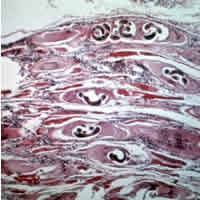What is Trichinosis?
Trichinosis, also called trichinellosis, or trichiniasis, is a parasitic disease caused by eating raw or undercooked pork or wild game infected with the larvae of a species of roundworm Trichinella spiralis, commonly called the trichina worm.

Trichinella spiralis larvae in
muscle tissue.
|
The great majority of trichinosis infections have either minor or no symptoms and no complications. There are two main phases for the infection: enteral (affecting the intestines) and parenteral (outside the intestines).The symptoms vary depending on the phase, amount of encysted larvae ingested, age, gender, and host immunity. Trichinosis initially involves the intestines. Within 1–2 days of contagion, symptoms such as nausea, heartburn, dyspepsia, and diarrhea may appear. Later on, as the worms encyst in different parts of the human body, other manifestations of the disease may appear, such as headache, fever, chills, cough, eye swelling, joint pain, muscle pain, splinter hemorrhage, petechiae, and itching.
The most dangerous case is worms entering the central nervous system. They cannot survive there, but they may cause enough damage to produce serious neurological deficits (such as ataxia or respiratory paralysis), and even death. The central nervous system is compromised by trichinosis in 10-24% of reported cases of a rare form of stroke. Trichinosis can be fatal depending on the severity of the infection; death can occur 4–6 weeks after the infection. Death is usually caused by myocarditis, encephalitis or pneumonia.
|